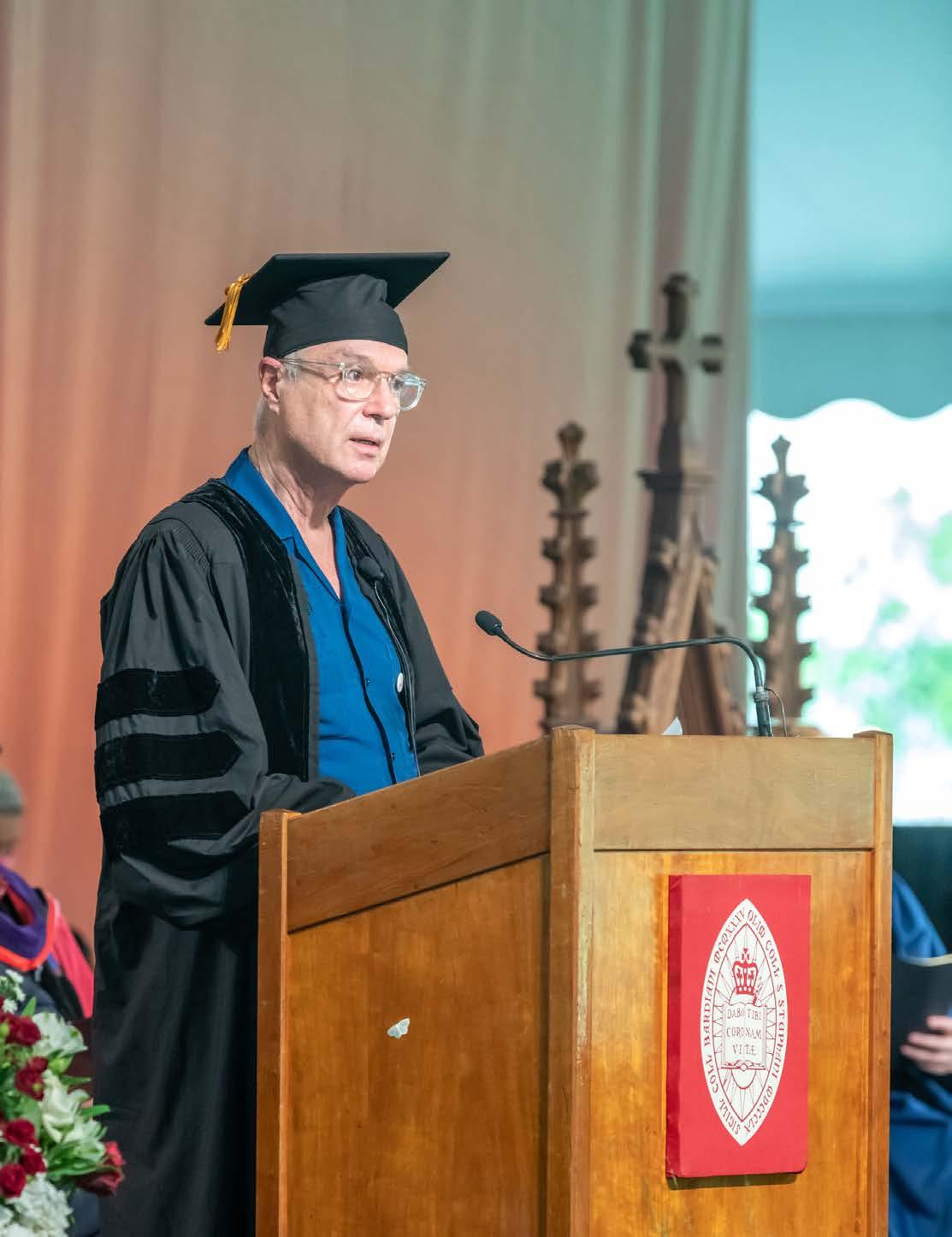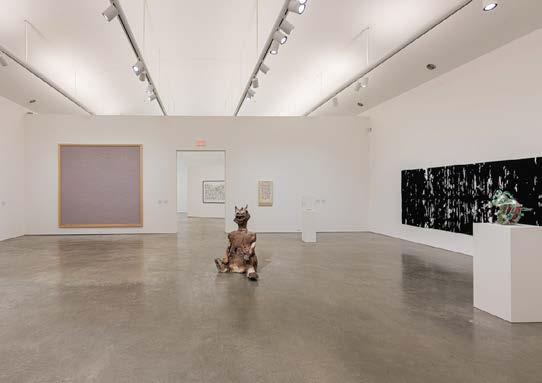
5 minute read
Education for the Global Good
OPEN SOCIETY UNIVERSITY NETWORK
Education for the Global Good
by James Rodewald ’82
Bard College has been—among many other things—a haven for distinguished writers, artists, intellectuals, and scientists fleeing Nazism; site of a World War II Army Specialized Training Program for elite soldiers studying languages or engineering; refuge for Hungarian students exiled after participating in the 1956 revolution against the Stalinist government; leader in the early college movement; and advocate for the underserved. Through all the ups and downs, political twists and turns, social upheavals, and humanitarian crises, Bard has been steadfast in its commitment to freedom, human dignity, and education for the common good.
An expansion of that commitment occurred in January, when financier George Soros announced a $1 billion donation from his Open Society Foundations (OSF) to support a new international network of universities with the aim of promoting “critical thinking, open intellectual inquiry, and fact-based research to strengthen foundations of open society amid authoritarian resurgence.” The Open Society University Network (OSUN) is jointly led by Bard and Central European University (CEU), a graduate institution founded by Soros in Budapest that was forced to move its center of operations to Vienna last year under pressure from the persistently illiberal Hungarian government, which has curtailed academic freedom and made CEU illegal as an American degree-granting institution.
The new network builds on decades of Bard’s higher-education collaboration and community-engagement experience. For example, the Center for Civic Engagement (CCE) includes a range of student- and faculty-run initiatives, such as the Trustee Leader Scholar (TLS) program and the Human Rights Project, under its umbrella. Several ongoing institutional initiatives —including the Bard Prison Initiative (Max Kenner ’01), the free Spanish-language magazine La Voz (Emily Schmall ’05 and Mariel Fiori ’05), and the mentorship program for young men of color from underserved communities Brothers at Bard (Dariel Vasquez ’17 and Harry Johnson ’17)—began as TLS projects. “We decided to create an institutional culture of serious, thoughtful and nonpartisan engagement in the world,” President Leon Botstein told the New York Times in 2011, when CCE was established. That culture has grown tremendously over the last decade in Annandale and internationally, and OSUN will expand educational access to “neglected and minority populations, such as incarcerated persons, the Roma, and refugees.” Botstein has been named the first and founding chancellor of OSUN, an appointment that runs concurrently with his role as president of Bard.
“The network brings resilience and sustainability,” says Jonathan Becker, Bard’s vice president for academic affairs and one of OSUN’s two vice chancellors. (Liviu Matei, provost of CEU and father of Daniel Matei ’19, is the other). OSUN also greatly increases learning opportunities for students through study-away programs, civic engagement projects, student conferences, and virtual international exchanges. There will be shared curricula to facilitate student movement among the institutions; joint degree programs; and network courses, which unite students and faculty from several universities located in different parts of the world in the classroom, sharing faculty and conducting joint research projects in which people from many universities collaborate. Becker recently taught a network course on civic engagement in partnership with four other institutions. “We’ve been experimenting with these over the last few years, and we’ve realized that more engagement between students in different campuses is better,” Becker says. Bard students and faculty now have even more ways to engage.
Much of what OSUN aims to do in the short term expands on the current work of CEU and longtime Bard Network members such as Al-Quds University in the West Bank, and American University of Central Asia in Kyrgyzstan. For its part, CEU has a Global Teaching Fellows Program that places doctoral students and recent doctoral graduates in international partner institutions. Those models will also be adapted to initiatives at other OSUN higher education institutions: Brac University in Bangladesh, American University of Bulgaria, Sciences Po in Paris, Bard College Berlin, Universidad de los Andes in Colombia, Ashesi University in Ghana, European Humanities University in Lithuania, Birkbeck: University of London, SOAS University of London, and Fulbright University of Vietnam. Arizona State University, a leader in distance learning, is the other current United States–based school. The research institutions and educational organizations in OSUN are Carnegie Council for Ethics in International Affairs (U.S.), Chatham House (U.K.), Institute for New Economic Thinking (U.S. and U.K.), Institut für die Wissenschaften vom Menschen (Vienna), Open Society Archives (Budapest), Rift Valley Institute (Kenya), and the Talloires Network, an international association of institutions headquartered at Tufts University in Massachusetts that is focused on promoting civic education. A “scholars at risk” program will connect academically excellent scholars who are politically endangered through this new global network. Additional partners with shared values and principles will be welcomed in the future.
Areas of particular focus for OSUN will include democracy, sustainability and climate change, inequality, human rights, transnational politics, and the arts and society. Bard brings a wealth of experience in those areas, as well as teacher-education programs focused on student-centered learning, early college and microcollege programs that help prepare disadvantaged students for university, programs to help refugees and other displaced people enter or resume college, and civic engagement programs. “We’re continuing a number of programs, we’re expanding on some of them, and we’re launching and developing new programs all at once,” Becker says. One such new program, a partnership between OSUN and the Talloires Network, Communities of Virtual Alliance and Inter-Dependence (COVAID) supports universities engaged in the global response to COVID-19.
Key goals of the new network are to integrate learning and the advancement of knowledge across geographic and demographic boundaries, promote civic engagement on behalf of open societies, and expand access of underserved communities to higher education. OSUN is distinguished by the breadth and depth of integration across participating institutions, by its shared commitment to advance open society and address fundamental global challenges, and by its members’ geographic and institutional diversity. Innovative uses of online platforms and connected learning approaches will facilitate OSUN’s efforts to bring together students, faculty, and researchers from diverse communities into regular interaction and collaborative learning. OSUN will integrate curricula, courses, and research initiatives across different countries and create a vibrant network of diverse institutions, which will include institutes of advanced studies, think tanks, museums, and artistic, cultural, and educational centers.
Botstein, who hopes OSUN will “succeed in providing greater access to high quality higher education among underserved populations and help strengthen the role and presence of art and culture in higher education in the defense of freedom and in the practice of democracy,” called OSUN, “the most transformative initiative in higher education I have witnessed in my career. It promises robust and diverse partnerships, and innovation extending critical inquiry, research, and scholarship on an international scale.”
For more information, visit osun.bard.edu.








